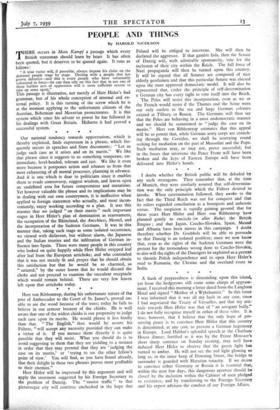Our national tendency towards opportunism, which is thereby exploited, finds
expression in a phrase, which fre- quently occurs in speeches and State documents: " Let us judge each case as it arises and on its merits." We like that phrase since it suggests to us something temperate, un- immediate, level-headed, tolerant and just. We like it even more because it postpones action and releases us from that most exhausting of all mental processes, planning in advance. And it is one which is dear to politicians since it enables them to evade controversy, suggest wisdom, and leaves open an undefined area for future compromises and mutations. Yet however valuable the phrase and its implications may be in dealing with our own countrymen, it is ineffective when applied to foreign statesmen who actually, and most incon- veniently, enjoy working according to a plan. It was this manner that we judged " on their merits " such important stages in Herr Hitler's plan of domination as rearmament, the occupation of the Rhineland, the Anschluss, Memel, and the incorporation of the Sudeten Germans. It was in this manner that, taking each stage as some isolated occurrence, we viewed with disfavour, but without alarm, the Japanese and the Italian treaties and the infiltration of German in- fluence into Spain. There were many people in this country who looked on quite happily while Herr Hitler stripped leaf after leaf from the European artichoke; and who contended that it was not merely fit and proper that he should obtain this satisfaction but that he would be so charmed, so " satiated," by the outer leaves that he would discard the choke and not proceed to examine the succulent receptacle which would remain behind. There are very few leaves left upon that artichoke today.
* * * *










































 Previous page
Previous page